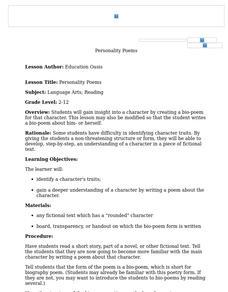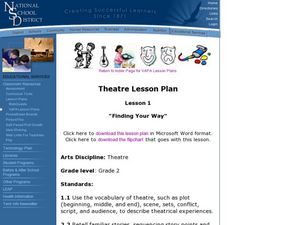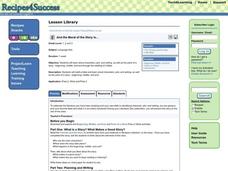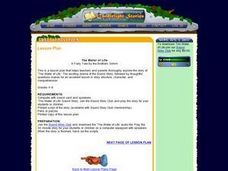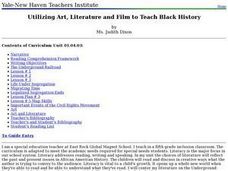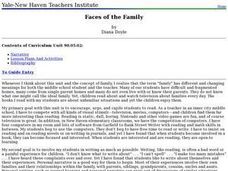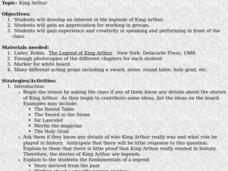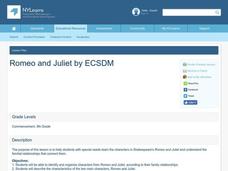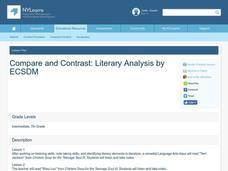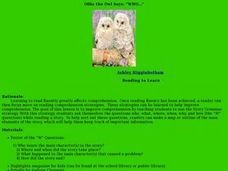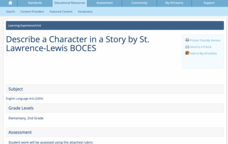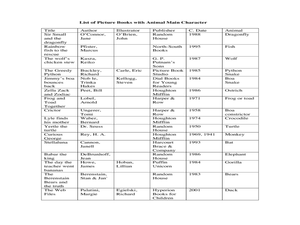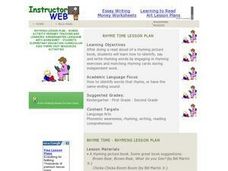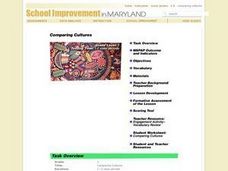Curated OER
Identifying Types of Native American Stories
Young scholars read Native American stories and record information on forms about them. They identify the type of story, its significance, and purpose. Students determine what the readers/listeners should learn from the stories.
Curated OER
Soap Opera Unit of Work: KS4
Students view an episode of "Eastenders." They look at how the programme is structured in terms of individual scenes. Students view the opening of the soap and the significane of the theme music. They look at the characters and trace the...
Curated OER
Personality Poems
Students create a bio-poem for themselves or characters in stories they have read. They explore common character traits.
Curated OER
Theatre Lesson Plan: Finding Your Way
Second graders identify story elements in familiar stories from their lives. For this story elements lesson, 2nd graders act out familiar activities by following directions. Students read a story and discuss the story elements. Students...
Curated OER
And the Moral of the Story is...
Students discover the parts of a story through the retelling of a fable as well as characters, plot, and setting. This lesson is completed using the program Pixie to create an online storybook.
Curated OER
Responsibility and Jobs
Students identify community helpers. In this philanthropy lesson, students read Strega Nona and identify different characters' responsibilities in the story. Students use character traits to describe the main characters and make a list...
Curated OER
The Water of Life
Students listen to the fairy tale "The Water of Life" by the Brothers Grimm. Using the text, they answer comprehension questions and retell the story to their classmates. They identify the plot and the main characters and role play...
Curated OER
Utilizing Art, Literature and Film to Teach Black History
Fifth graders are introduced to different aspects of African-American history through literature, art, and films. As a class, they are read a story about the Underground Railroad, identify the main characters and put the events into...
Curated OER
Faces of the Family
Pupils and teachers share their individual concept of families to begin the lesson. As they read different pieces of literature, they keep a journal of the activities and problems each main character gets into. To end the lesson, they...
Curated OER
Explore Puss In Boots
Learners listen to a fairy tale "Puss in Boots". Using the text, they answer comprehension questions and discuss them as a class. They discover the story structure and identify the main characters. They also have a chance to share their...
Curated OER
My Book Report
In this literacy/writing worksheet, students compose a book report. Students identify the following literary elements: main characters, setting, beginning, problem and solution. Students then compose paragraphs for each of these story...
Curated OER
Story Elements: Lilly's Purple Plastic Purse by Kevin Henkes
In this story elements worksheet, students respond after reading Lilly's Purple Plastic Purse by Kevin Henkes. Students identify the setting, main characters, problem and solution. Students write their notes in purse shapes.
Curated OER
King Arthur
Students explore literary classics by reading The Legend of King Arthur. In this legendary story lesson plan, students read the story The Legend of King Arthur and identify the main characters and how they will reenact the story....
Curated OER
Romeo and Juliet
Use this SMART board activity to review the familial relationships in Romeo and Juliet. Review the characters from the play using descriptions first, then in the context of the other characters. The SMART board file (included) guides...
Curated OER
Compare and Contrast: Literary Analysis
Seventh graders are able to use active listening skills, take notes and identify literary elements of a short story. They use/create graphic organizer, compare/contrast literary elements from various stories and compare and contrast traits.
Curated OER
Ollie the Own Says: WHO
Scholars examine the strategy of making a story map or outline to identify the main elements of a story. They discuss the who, what, where, when, why, and how of a story, in an outline form. As a class they read a short story, answer the...
Curated OER
Describe a Character in a Story
Second graders should be familiar with characters of a story and adjectives. The students should have some knowledge of Kidspiration. After reading a story, they will use Kidspiration and create a character web to describe a character in...
Curated OER
Find an Animal! Find a Book!
Learners identify the themes of different books by classifying their genre. In this genre lesson, students examine a specific animal by reading both a nonfiction and fiction book about the species. Learners compare the different books...
Curated OER
Rhyme Time Lesson Plan
What words rhyme? Help young learners deepen their understanding of rhyming words with this interactive plan. First they identify some words that rhyme, then they participate in a picture walk. Use books with rhyme, like Come Rhyme with...
Curated OER
Comparing Cultures
Young readers compare two stories/cultures, identifying how they are alike and different. They share their own version of a well-known story and adapt it to another culture. They explain their adaptations.
Curated OER
Identifying and Describing Story Elements
First graders examine how to identify the different elements of a story and how they fit in a definite sequence. The use of comprehension skills is essential to retell the story as desired within the instructional activity.
Curated OER
Character and their Significance
Learners read short stories and write a response to the story about the character and their significance. In this character lesson plan, students also create a poster to represent their character.
Curated OER
Reader's Theater with a Twist
Second graders create a Reader's Theater script. In this reader's theater lesson plan, 2nd graders create their own script of a story in groups. They make props and act them out on FlipVideo and voice thread.
Curated OER
Character and Plot Development Through Comics
Third graders are introduced to character, plot development, point of view, and tone through the use of comic strips. They, in pairs, identify these four attributes in the comic strip and present their findings to the class.




